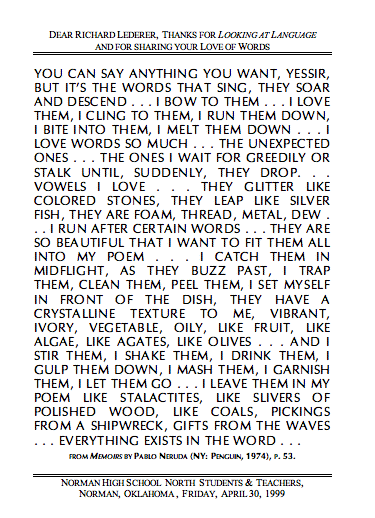|
 Day 17 Petrarchan (or Italian)
Sonnet Day 17 Petrarchan (or Italian)
Sonnet
In discussing the Italian Form, Charles
Gayley has noted that “The octave bears the burden; a doubt,
a problem, a reflection, a query, an historical statement, a
cry of indignation or desire, a vision of the ideal. The sestet
eases the load, resolves the problem or doubt, answers the query,
solaces the yearning, realizes the vision.”
|
S
5
10
|
The Illiterate by William Meredith
Touching your goodness, I am
like a man
Who turns a letter over in his hand
And you might think that this was because the hand
Was unfamiliar but, truth is, the man
Has never had a letter from anyone;
And now he is both afraid of what it means
And ashamed because he has no other means
To find out what it says than to ask someone.
His uncle could have left the
farm to him,
Or his parents died before he sent them word,
Or the dark girl changed and want him for beloved.
Afraid and letter-proud, he keeps it with him.
What would you call his feeling for the words
That keep him rich and orphaned and beloved?
|
|
At first reading, this poem may seem to
be about illiteracy and the power of words, but read it again,
paying special attention to the the simile that begins in line
1. What is this poem really about?
Listen to a reading of this
poem.
 
Your Turn: Ah,
words. Explore your own “feelings for words that keep [you]
rich and orphaned and loved.”
Download
a copy of this passage from Neruda's Memoirs.
|
 Day 17 Petrarchan (or Italian)
Sonnet
Day 17 Petrarchan (or Italian)
Sonnet